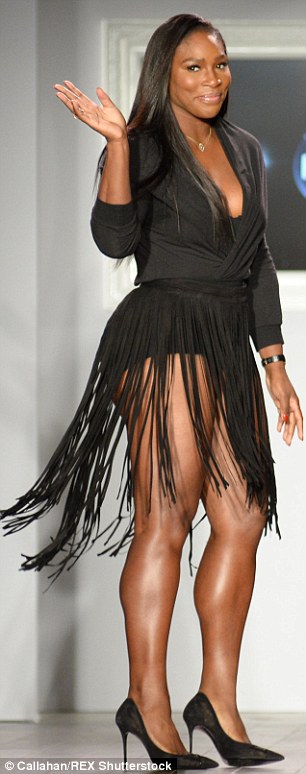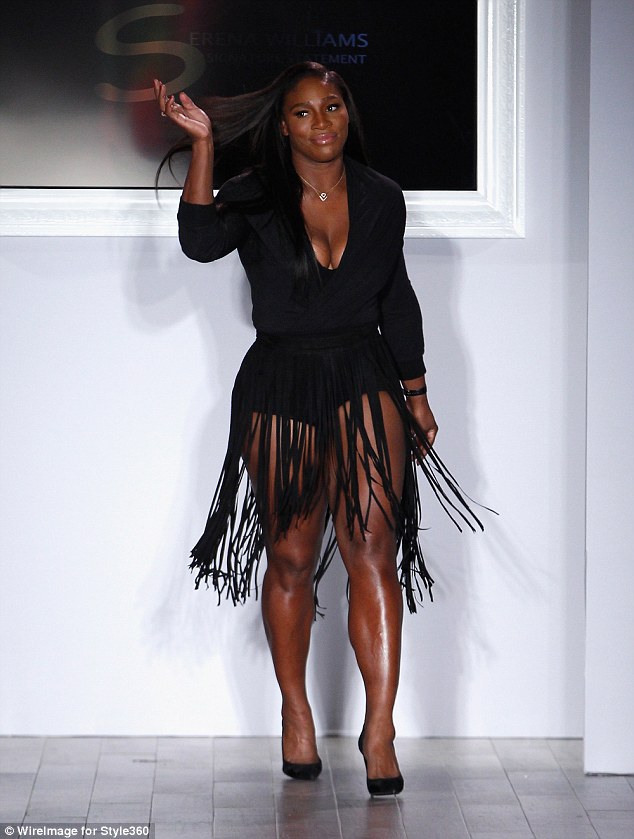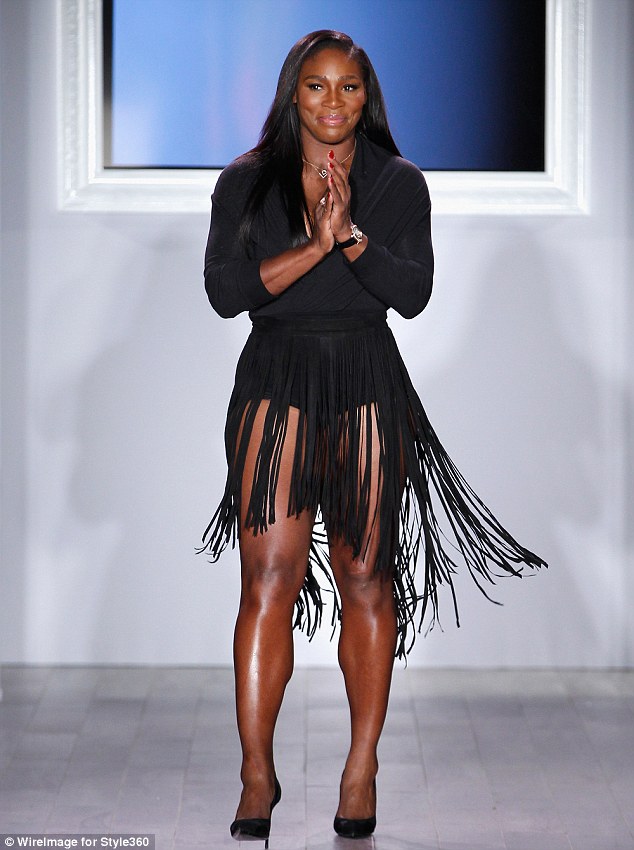It’s a little past midnight at HSN headquarters, and Serena Williams is nine minutes into a disquisition on a piece of fabric she’s called “Convertible A-line Top With Scarf,” available to you, the home shopper, for $39.95 or three “flexpays” of $13.32. “It’s like one huge circle that has a lot of style in it,” she says, not without conviction, fiddling with the bottom of the one she is wearing (“This is, um, mustard”), flapping it like a fan, rubbing one hand on her arm, and smoothing her hair. She forgets the names of colors, misstates a price. There with the right number and the right name is HSN savant Bobbi Ray Carter, sheathed in a hot-pink Convertible A-line Top With Scarf and raccooned in black eyeliner, filling in her co-host’s “ums” with the deft patter of a sales professional: “Amazingly transitional, think-fall-think-summer-think-winter-summer-into-fall versatility, quality, surprise scarf.” Bobbi Ray Carter knows how to touch a piece of fabric: She gives it a crisp snap between her fingers, smartly smooths the drape, all the while growing progressively more tense as Serena fumbles some hangers and launches, at 56 minutes, into a long anecdote about packing jeans for Wimbledon. “Mmmm,” says Bobbi Ray Carter, tight-lipped and possibly not breathing, awaiting the arc of Serena’s story to make its mumbly descent — “I felt good packing my own jeans, I had a moment there” — so she can finally change the subject — “And it’s our customer pick!” — and steer us back to the safe harbor of Denim Moto Legging color choices.
A little background on HSN’s least comfortable saleswoman: Serena Williams is the best women’s tennis player in the world, breezing through one of the best seasons of her life. Should she win the U.S. Open next month, she will have swept all four grand slams in a calendar year, cementing her reputation as the greatest women’s player of all time and making her a serious contender for the greatest athlete of her generation.
She is a 33-year-old woman who won her first major at the tail end of the previous century, a simpler era you will recall for its consequenceless Napster-facilitated intellectual-property theft and the looming threat of Y2K. By now, her shoulder should be shredded, her elbow a constant wail of hurt. Instead, she spends her days bageling 20-something moppets who have never known the game without her. The last time a man as geriatric as Serena won a grand slam was 1972. She has won three in the past six months. Her 16-year run is, in the words of Sports Illustrated, “one of the most sustained careers of excellence in the history of athletics.”
“I didn’t think it would last this long,” says Serena, on break from the HSN grind.
“Not to suggest that your career is over — ”
“But even if it was over,” she interrupts, “it’s a really long career.”
Serena Williams travels with her teacup Yorkie, Chip, and dreamboat assistant, Grant, who went to Haverford and plays lacrosse. She is here hawking “Serena’s Signature Statement Collection,” because her career will one day end and she wants there to be something beyond nostalgia on the other side of it. Williams isn’t much for nostalgia. “I have lots of trophies, and I’m just — I’m not that person that needs to see all these trophies,” she says, under a blanket in the greenroom with Chip on her lap. “I have some in my house here, some in my house there, some I don’t know what happened to ’em. I have my grand-slam trophies … somewhere.”
A flippant past-tenseness has crept into her language. “We were so fast,” she says of herself and her sister Venus as children. “We are. We were. Gosh, is this over?” She laughs. There’s a weird anxiety in her stilted professional bio: Serena “continues to also pursue her other interests and has set herself up for a career after tennis.”
Serena is the daughter of one Richard Williams, the perfect embodiment of his perfectly executed, perfectly bonkers plan. You may have heard that Richard was watching TV when he saw a Romanian player win $40,000, at which point he decided to learn a game he knew nothing about, teach this “sissy sport” to his athletic wife, Oracene, and conceive two children whom the Williamses would together turn into champions. You may have heard about the used tennis balls he cadged from country clubs, the 78-page typewritten document in which he detailed his training regime, the broken glass on the Compton courts. But the story is a good deal crazier than you’ve heard, because the facts don’t conform to the tennis-as-ticket-out-of-the-ghetto song-and-dance the networks used to play before a match. Richard Williams was not a poor black man living in the hood. He was the comfortable — very comfortable, according to his autobiography — owner of a security company who lived in Long Beach with his wife and five daughters. He moved his family to Compton, where Venus and Serena served to the sound of gunfire and his stepdaughter was later shot to death, because he thought it would “make them tough, give them a fighter’s mentality.” Oracene Price was against this plan then; one can only imagine what she thinks of it now.
Entire childhoods were devoted to slapping serves over the net and running the court in the California heat, the mundane and lactic-acid-inducing specifics of a 78-page training regime. “If you fail to plan, you plan to fail” is an incantation Richard imposed on his daughters, who were made to keep journals about their goals and how best to achieve them. Serena’s onboard-ness, her total and unquestioning obedience to her father’s vision, is best illustrated by an anecdote she tells in her autobiography, On the Line, in which her father walks around the corner to get sports drinks mid-practice, leaving the girls alone with a basket full of tennis balls and a sack of oranges for a snack. Nine-year-old Serena impishly tosses up some oranges and serves them over the net, to her father’s consternation. End of story. “I’ve got no justification or explanation for my behavior,” she writes. “It was just that devil streak spilling forth … I just went a little crazy.” This is the sum total of what Serena Williams has to say about youthful rebellion, and she still thinks it’s pretty outrageous.

Serena wanted not just to design clothes but to design wedding dresses. “That was my first real love,” she says, “but then I was like, Listen. I’m playing professional tennis. I’ll just do athleticwear.” In her sartorial interests, as in all things, she followed Venus, who encouraged her to take some college design classes. Together, they brought to the game black lace, flesh-colored underwear, and knee-high sneaker boots. Today, Venus has her own line, EleVen — “Ten is just another number, but EleVen is a lifestyle” — an affordable athleticwear line far tamer than much of what Serena and Venus wear on the court. “We brought fashion back to tennis,” Serena says. “It was great when Chris Evert was around. Tracy Austin had some great designs. But the ’90s was not a good time.”
Inevitably, the sisters’ on-court style was described as “confrontational.” One sensed in early accounts of the Williams sisters’ dominance, and senses even now, a certain tightening of the available vocabulary in describing a muscular black woman on the court. Doubles-sideline-to-doubles-sideline-in-three-strides is an act of avian grace, and yet Serena is perpetually “crushing” and “slamming” and “rolling over,” as if the entire sports commentariat picked up English at a construction site. It’s instructive here to spend a few minutes googling “Roger Federer,” two words that inspire sportswriters to pseudo-spiritual cant: Federer crushes and slams but also “lifts” and “lobs” and “taps,” his stroke “liquid,” his forehand a humanity-saving treatise on the seraphic potential of the fallen human form, his feminine delicacy evidence that he exists on a higher spiritual plane. When Serena and Venus are called “masculine,” when they are accused of having been born male, when the head of the Russian Tennis Federation calls them “the Williams brothers,” it is not meant as a compliment. This impulse may also explain why Serena Williams, who has prevailed over Maria Sharapova 18 times and fallen to her only twice, makes less in endorsements than her blonde Russian counterpart, and why last month political pundit David Frum, whom no one has ever accused of being excessively masculine, publicly speculated that Serena was on steroids, whereas Venus had stopped juicing in order to get pregnant.
Serena and Venus can never simply be Serena and Venus. They are inevitably spectacle, fodder for abstractions both crude and lyrical. They have inspired not just racist commentary but also celebrated works of poetry. “Some tough little European blonde / pitted against that big black girl from Alabama / cornrowed hair and Zulu bangles on her arms / some outrageous name like Vondella Aphrodite,” wrote white poet Tony Hoagland, whom many confused for the racist speaker of his poem. “And you loved her complicated hair / and her to-hell-with-everybody stare.” Their losses could not simply be their losses. “Every look, every comment, every bad call blossoms out of history, through her, onto you,” writes black poet Claudia Rankine, of Serena, in her book Citizen, which was nominated for a National Book Award. These are works in which the sisters stand for the Sweep of History or the Black Body, and they do little to prepare one for meeting a five-nine, selfie-obsessed, hyperfeminine phenom under a blanket and a Yorkie.
Serena has been ascendant for so long now that it’s easy to forget how highly anticipated were her matches with her sister. (Venus Williams, at 35, suffering from an immune disease known as Sjögren’s syndrome, is currently ranked a more than respectable 15th.) It was a Serena-Venus match in 2001 that precipitated the infamous Indian Wells incident, in which the crowd grew enraged after an injured Venus withdrew. This was a time when Richard was often accused, in the absence of any corroborating evidence, of fixing matches such that he decided which daughter would win a tournament. With her sister out of sight, the crowd turned its ire on Serena, slinging slurs from high arena seats down to the 19-year-old woman standing alone between bright white lines. Her father turned toward the hecklers, fist raised in a black-power salute. “I will not play there again,” Serena says of Indian Wells in On the Line. “I won’t go back. I will not give these people the validation. I will not stand down.”

One can only speculate about whether the Williamses would have been better received had they been more willing to conform, to pretend to care about tennis tradition, to hop on Nick *Bollettieri’s tennis-star assembly line. They never nailed the rehearsed humility, never mastered the stone-faced just-want-to-do-my-best-so-grateful-for-the-opportunity-thanks-to-all-my-amazing-fans act calibrated to negate the possibility of an athlete’s interiority. Serena answers most questions with mischievous half-statements, eyebrows raised over a good-natured ironic side-eye. On her eventual retirement: “I will finally be able to make some Miami Dolphin games,” she says, laughing, “and make some, uh, better decisions down there with the players.” On the way she has changed the game: “My dad taught us to have early preparation. I notice the other girls have similar preparations to mine, and I’m like, ‘Hmmm … well, you don’t want to admit where you got that from, right?’ ”
Richard Williams is a man who says what he thinks. Serena Williams is a woman who says what she thinks and follows it up with a winking retraction. On Indian Wells: “All I could see was a sea of rich people — mostly older, mostly white — standing and booing lustily, like some kind of genteel lynch mob.” Then, “I don’t mean to use such inflammatory language,” though she evidently did not not mean it enough to delete it from her autobiography. There was her 2011 attack on an umpire after a bad call, about which Serena seems less outraged than genuinely hurt: “You’re nobody,” she said, “you’re ugly on the inside.” Asked about this later, Williams was mostly concerned with the indisputable lameness of her trash-talking: “What a nerd!” And then there is 2009 — the “I’ll fucking take this ball and shove it down your fucking throat” incident, for which she was fined $82,500. “She topped me that one time,” John McEnroe said. Of the outraged reaction to her outrage, Williams tells me, “I just think it was weird. I just really thought that was strange. You have people who made a career out of yelling at line judges. And a woman does it, and it’s like a big problem. But you know, hey.”
But You Know, Hey could be the title of a second Williams autobiography, subtitle The Mellowing. This spring, after a 14-year boycott, she returned to Indian Wells, writing in Time that she wanted “a different ending” to an ugly episode, though she assures me she will still engage in something she calls “being myself.”
“If someone has a bad call, I’m really forthcoming. I’ll look you in the eye and say, ‘Are you sure?’ I’m okay with confrontation. I’ve just” — eyebrow raise — “changed the way I state certain things.”
Richard Williams’s autobiography is called Black and White and barely even approaches the subject of tennis until 150 pages in. Up until that point, it is an account of his family’s treatment at the hands of white people and a memoir of his own “acts of defiance against white people.” Christmas to the child Richard was “a holiday created by and for white people.” His daughters would have to “run even harder, just like I did when I was fleeing white people in the South.” He wondered: “Would the entrance of strong, fast, ghetto-bred black people into the game change it as dramatically as it had all other sports? … My plan was simple: to bring two children out of the ghetto to the forefront of a white-dominated game.”
Until I read Black and White, I had assumed Serena’s swagger to be a result of her talent, intertwined with but ultimately exogenous to that 78-page plan. But Richard was grooming his girls for a takeover, bestowing upon them a carapace strong enough to withstand the doubt, discomfort, and contempt of an entire culture. Winning depended on self-belief so impenetrable that a genteel lynch mob could not slice through. This was all part of the vision: a “fighter’s mentality”; a lacrosse-playing, Haverford-attending yes-man; that to-hell-with-everybody stare.
Serena hadn’t been aware of Rankine’s Citizen. I read some to her while, in the background, a redheaded HSN sales professional moves some units of Serena’s Wide Leg Knit Jumper. I ask what it is like to bear the weight of representing people of color, women, 33-year-olds who want to believe in the imagined possibility of their athletic dominance.
“I don’t think about it,” she says. “I don’t dwell in the past. If I do, I’ll be swallowed up by negativity. As Mandela once said, ‘I will be in a mental prison.’ ”
It’s a ballsy thing to do, quoting Nelson Mandela in your explanation for why you’re not going to think about race right now. But Serena is not yours or mine, and she is less and less her father’s daughter. There can be no further distance from Compton-tough than the spectacle unfolding before Grant, Chip, and me, as Serena steps back on set. “Do you like French terry?” asks the saleswoman. “Who doesn’t?” replies Serena. Richard Williams raised her to go to war with the world. Post-tennis, she plans to live in it.
http://nymag.com/thecut/2015/08/ser...ennis-history-to-make.html?mid=facebook_nymag
































 cats here are so full of shit, take away her money and fame and y'all would call her tranny. Never once have I ever seen anyone post a woman who looks like Serena and the comments were no pull out.
cats here are so full of shit, take away her money and fame and y'all would call her tranny. Never once have I ever seen anyone post a woman who looks like Serena and the comments were no pull out.






